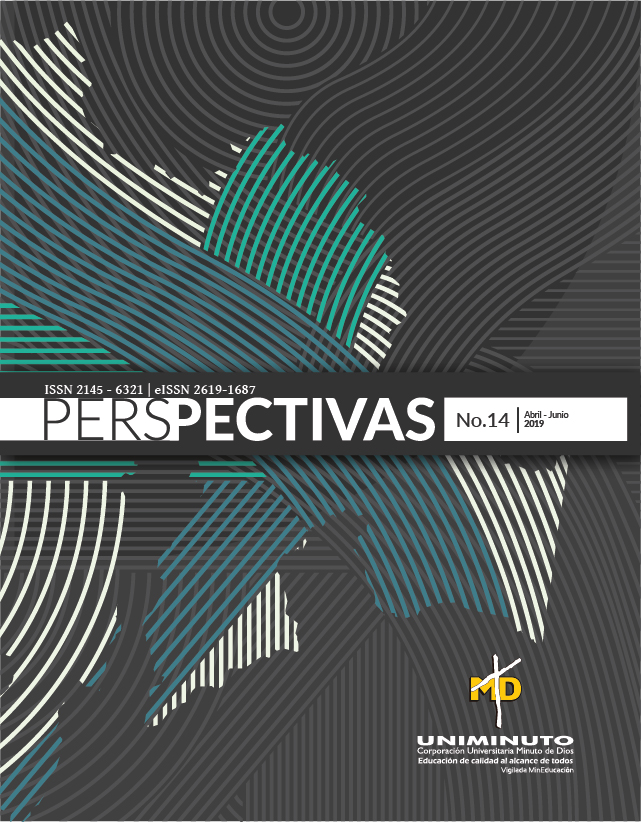Factores de Riesgos Psicosociales en Docentes UNIMINUTO
Barra lateral del artículo
Cómo citar
Detalles del artículo
Contenido principal del artículo
Resumen
La investigación tuvo como objetivo identificar los factores de riesgo psicosocial que afectan a los docentes de modalidad distancia tradicional de la Universidad Minuto de Dios Ceres La Vega (Cundinamarca), por ello esta se mueve alrededor del concepto de riesgo psicosocial establecido por el Ministerio de Protección Social como “condiciones psicosociales cuya identificación y evaluación muestra efectos negativos en la salud de los trabajadores o en el trabajo” (2005. p. 2).
Los resultados de dicho proceso dejan entrever que los docentes abordan en su trabajo diversas fuentes de problema, entendido como problema las situaciones requeridas para proyectar acciones afectivas del desempeño laboral, personal y familiar, algunas de ellas corresponden al ritmo y la inseguridad en el trabajo, ya que, si bien el profesional de la formación son los dinamizadores del proceso enseñanza aprendizaje, estos mantienen una contratación semestralizada.
Por lo anterior, los resultados encontrados en la investigación permiten plantear algunas recomendaciones de índole institucional cuya implementación pueden contribuir con la minimización de la percepción del riesgo por parte de los docentes.
Referencias
Betancourt, D. (2008). Resolución número 002646 de 2008. Ministerio de protección social- Bogotá D.C. Recuperado de: http://www.saludcapital.gov. co/Documentos%20Salud%2 0Ocupacional/RESOL.%202 64 6%20DE%202008%20RIES GO%20PSICOSOCIAL.pdf
Botero, C. (2012). Riesgo psicosocial intralaboral y “burnout” en docentes universitarios de algunos países latinoamericanos. Universidad Pontificia Bolivariana Medellín - Colombia. Recuperado de: file:///C:/Users/Familia%20Lopez/Downloads/ Dialnet- RiesgoPsicosocialIntrala boralYBurnoutEnDocen tesUni-5006545%20(1).pdf
Forbes, R. (2001). El síndrome de burnout: síntomas, causas y medidas de atención en la empresa. Recuperado de: https://www.cegesti.org/exitoempresarial/publicaciones/p ublicacion_160_160811_es.pdf
Ibarra, E. (2003). Capitalismo académico y globalización: La universidad reinventada. Educación y sociedad. Campinas. v. 24. N. 84. Recuperado de: http://www.scielo.br/pdf/es/v24n84/a17v2484.pdf
Ministerio de Protección Social (2005). Resolución 2646 de 2008. Recuperado de: http://fondoriesgoslaborales.gov.co/documents/Normatividad/Resoluciones/Res-2646-2008.pdf
Parra M. (2003). Conceptos básicos en salud laboral. Oficina internacional del trabajo. Central unitaria de trabajadores. Recuperado de: http://cvonline.uaeh.edu.mx/Cursos/Licenciatura/Enfermeria/ProgramaNivelacion/A2 1/Unidad%201/lec_13a_conceptos_basicos_salud_laboral.pdf
Pujol-Cols, L. y Arraigada, M. (2017). Propiedades psicométricas del cuestionario de riesgos psicosociales copsoq-istas 21 y aplicación en docentes universitarios argentinos. Cuadernos de Administración, vol. 30, núm. 55, septiembre-diciembre, 2017. Pontificia Universidad Javeriana Bogotá, Colombia. Recuperado de: http://www.redalyc.org/pdf/205/20555522001.pdf
Sarmiento M, (2012), Factores de riesgo psicosocial intralaboral: diagnóstico en personal terapéutico asistencial, universidad EAN facultad de posgrados Bogotá D.C. Recuperado de: http://repository.ean.edu.co/bitstream/handle/10882/3185/SarmientoMaria2012.pdf?sequence=4
Artículos más leídos del mismo autor/a
- Elizabeth Botello, Jenny Barbosa Becerra, Retrospectiva de la salud ocupacional y sus tendencias en investigación e innovación , Perspectivas: Vol. 3 Núm. 10 (2018): Abril-Junio
- Jenny Barbosa Becerra, Administradores, una reflexión sobre su formación , Perspectivas: Vol. 2 Núm. 5 (2017): Enero-Marzo

